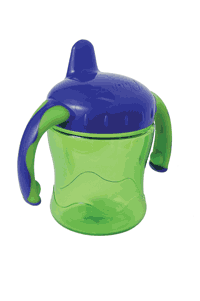Finally! Oregon Senate votes to ban toxic Bisphenol-A from baby bottles and sippy-cups
Kari Chisholm

It's a no-brainer. We should do everything we can to remove toxic substances from food packaging - especially those products designed explicitly for infants and toddlers, and especially when there are safe, non-toxic alternatives available.
A year ago, the State Senate failed - on a frustrating 15-15 tie vote - to ban Bisphenol-A, or BPA, from baby bottles and sippy cups.
But yesterday, the campaign to ban Bisphenol-A finally succeeded, winning a 20-9 vote in the Senate for SB 695. All sixteen Democrats and four Republicans voted in favor.
I'm glad to see a bipartisan vote. It's been rather baffling to see it become a partisan football in Oregon, when nine other states have passed a ban on strong, bipartisan votes. Senators Jason Atkinson (R-Central Point) and Brian Boquist (R-Dallas) get special recognition -- as they shifted all the way from voting against the bill a year ago, to co-sponsoring and championing it this year.
Now, it's on to the House (which is expected to be an easier hill to climb, but let's not take anything for granted, ok?)
 |
More Recent Posts | |
Albert Kaufman |
|
Guest Column |
|
Kari Chisholm |
|
Kari Chisholm |
Final pre-census estimate: Oregon's getting a sixth congressional seat |
Albert Kaufman |
Polluted by Money - How corporate cash corrupted one of the greenest states in America |
Guest Column |
|
Albert Kaufman |
Our Democrat Representatives in Action - What's on your wish list? |
Kari Chisholm |
|
Guest Column |
|
Kari Chisholm |
|
connect with blueoregon




11:41 p.m.
Apr 7, '11
Full disclosure: My firm provided some strategic assistance to the Oregon Environmental Council on their social media campaign on this legislation.
7:15 a.m.
Apr 8, '11
Atkinson seems to be evolving, at least on some environmental issues, and it's really pissing off the hard-core righties that used to love him.
11:02 a.m.
Apr 8, '11
Congratulations to the Oregon Senate.
This BPA ban is a very important issue, of course, but is just one of many having to do with production of plastics and their non-disposal, non-recycling.
I wish the entire Oregon legislature would convene for a screening of the new documentary, "Bag It".
1:22 p.m.
Apr 9, '11
I don't see how its a right left issue to get toxins out of plastic. The debate is normally over if there is conclusive evidence it is a toxin. Toxins should not be in anyone's drinking cups. They should study GMO products next.
8:38 p.m.
Apr 9, '11
Mark- people ingest all sorts of toxins as the result of plastics, everyday, as the toxins in the oceans are repelled by water and, therefore, attach to plastic bits, which are then ingested by fish (and on to people's dinner plates).